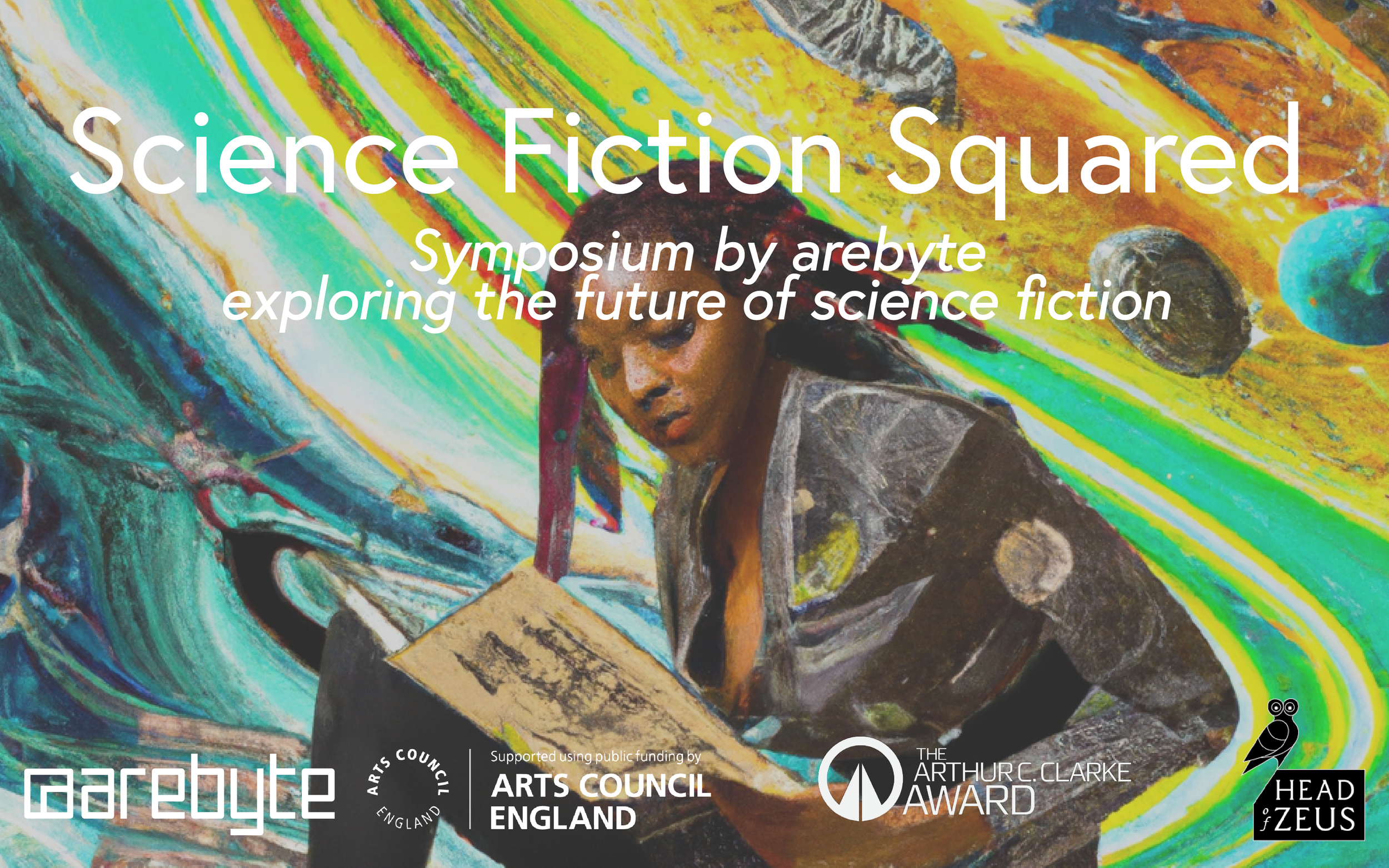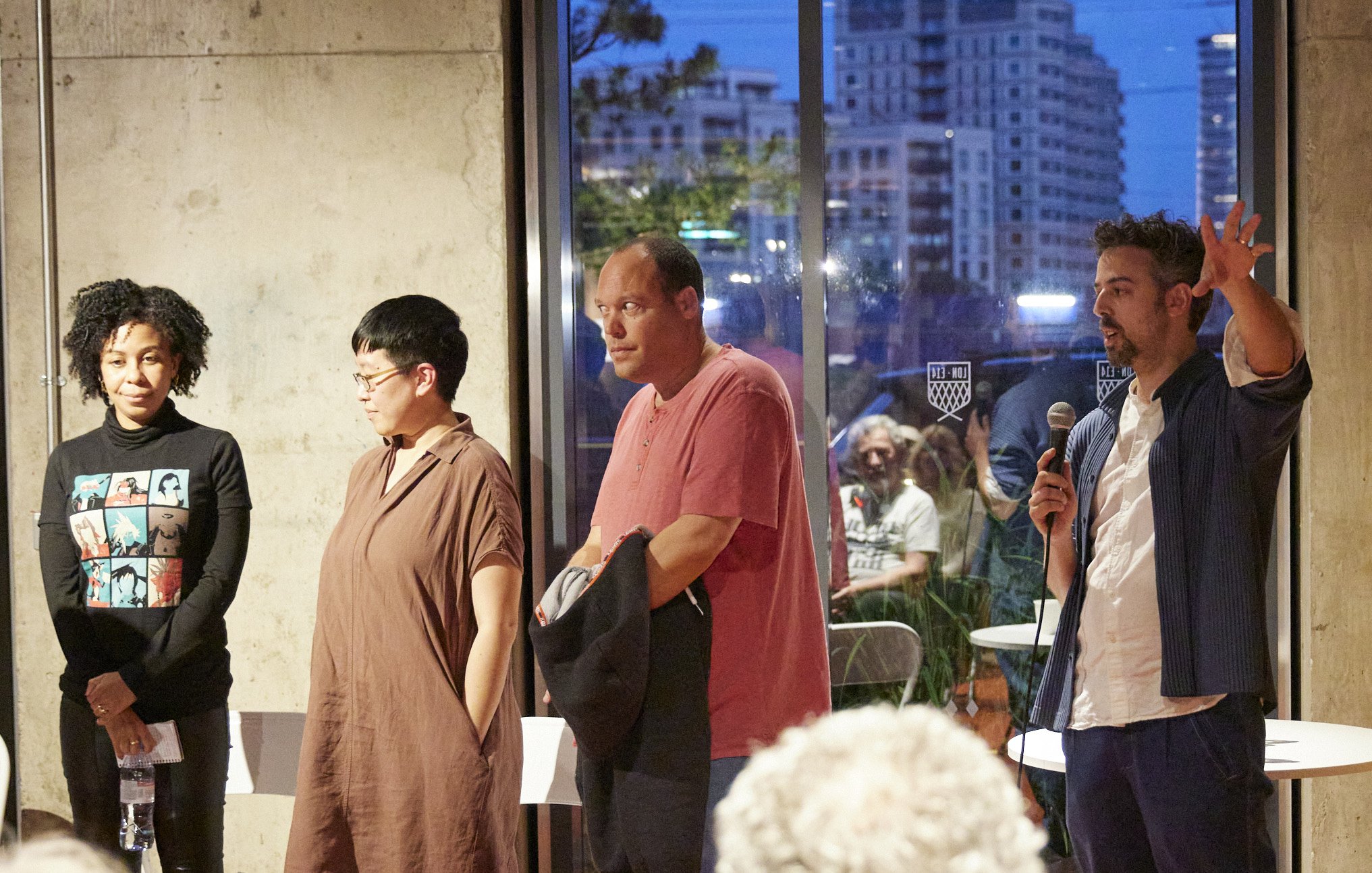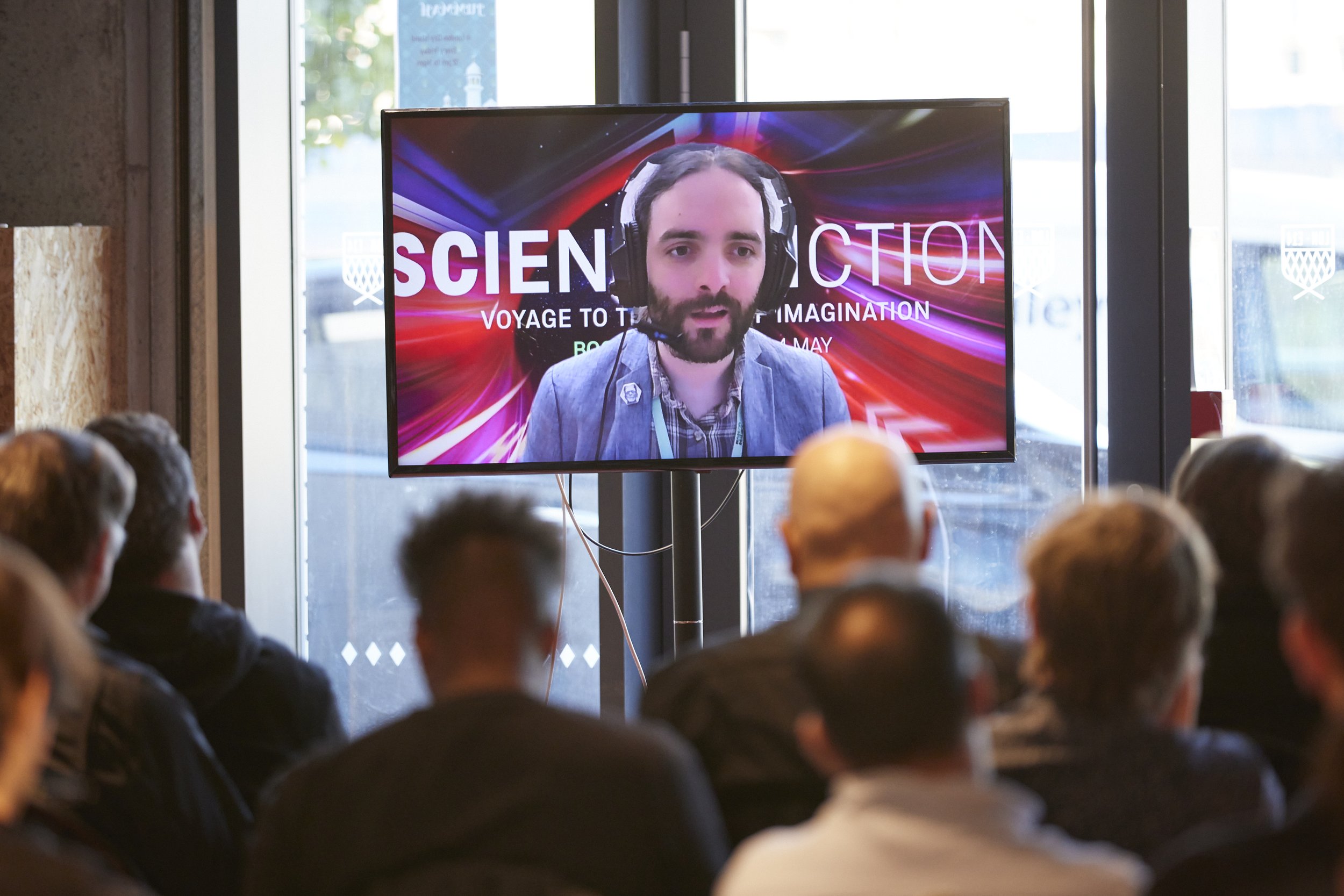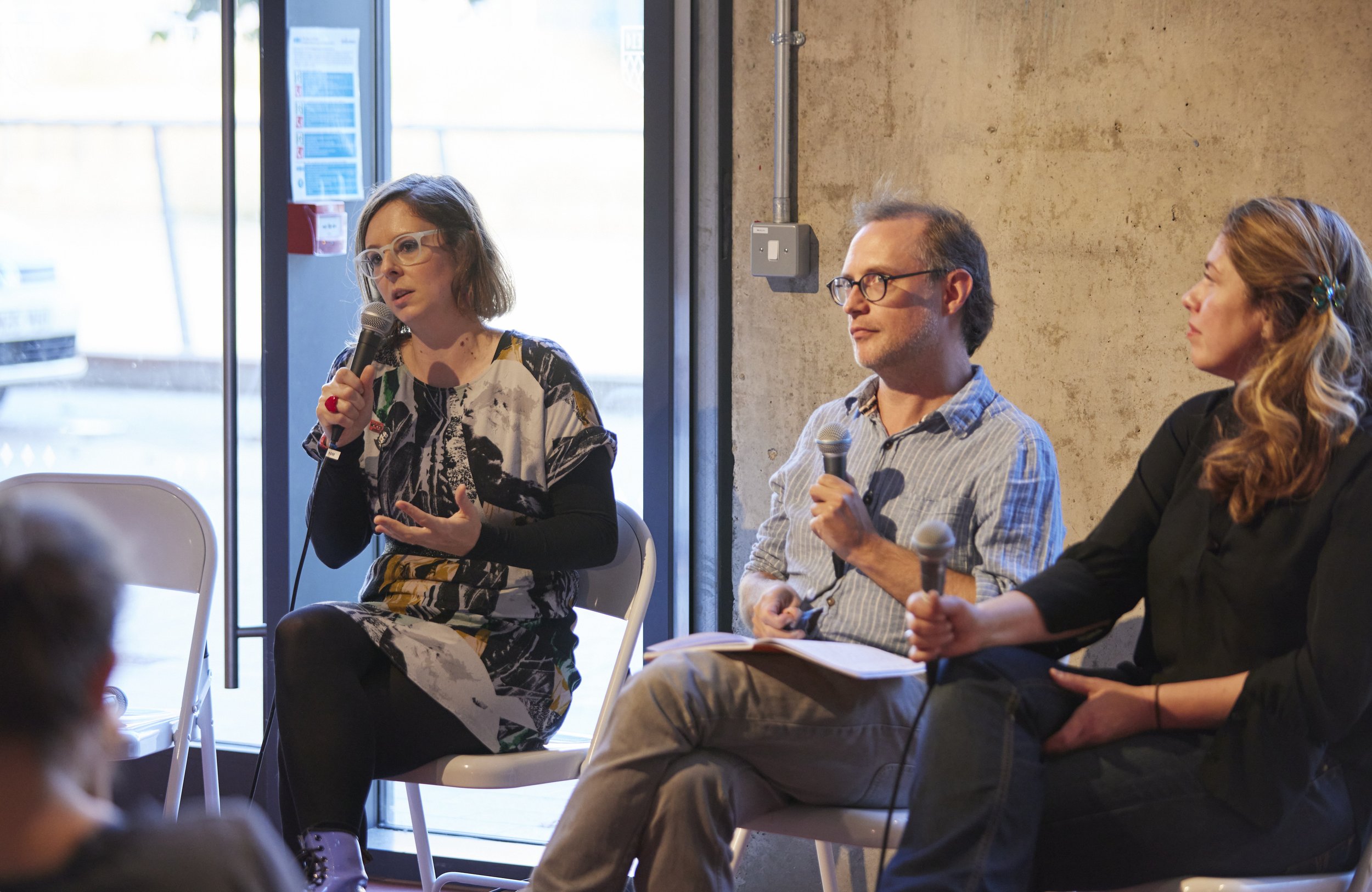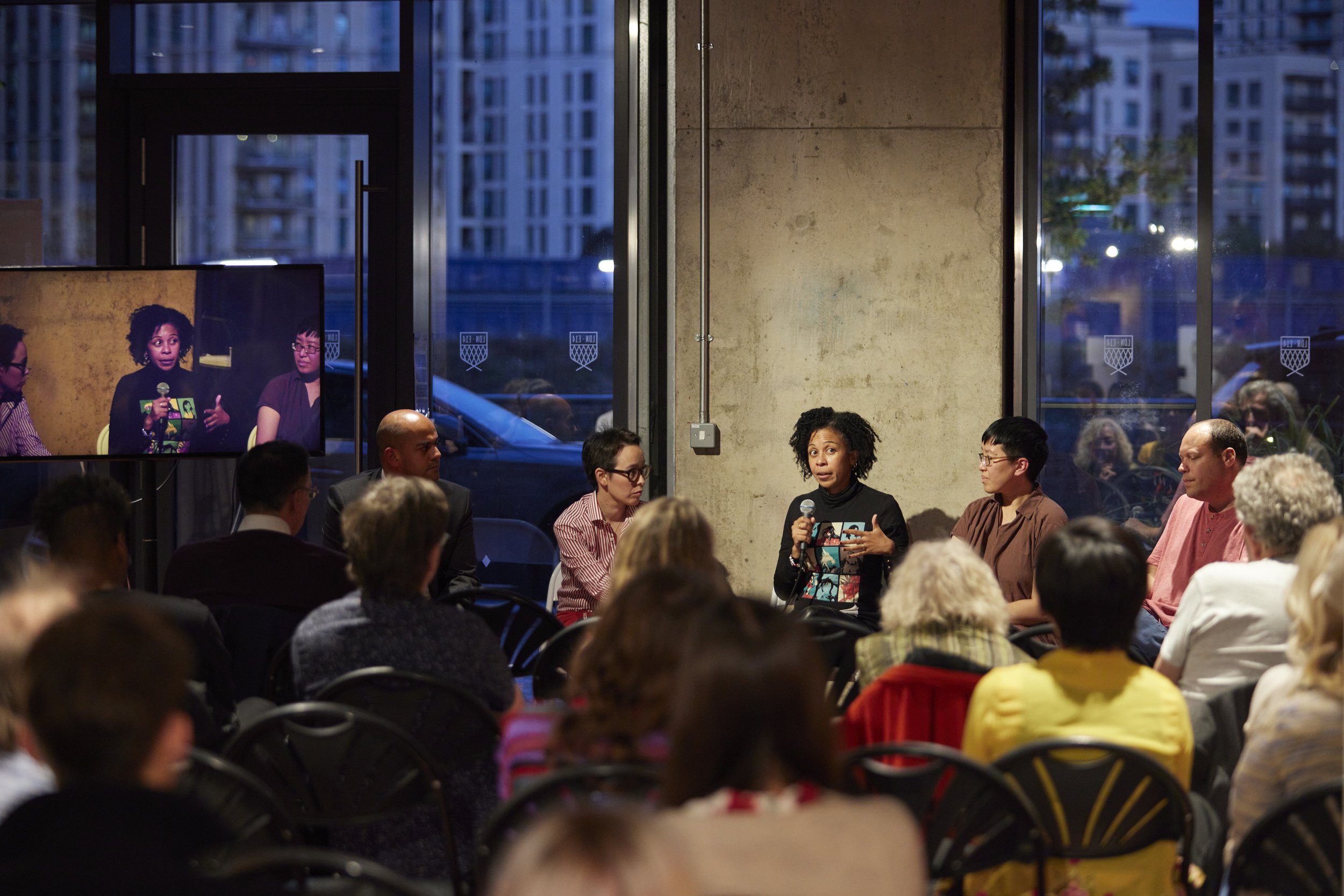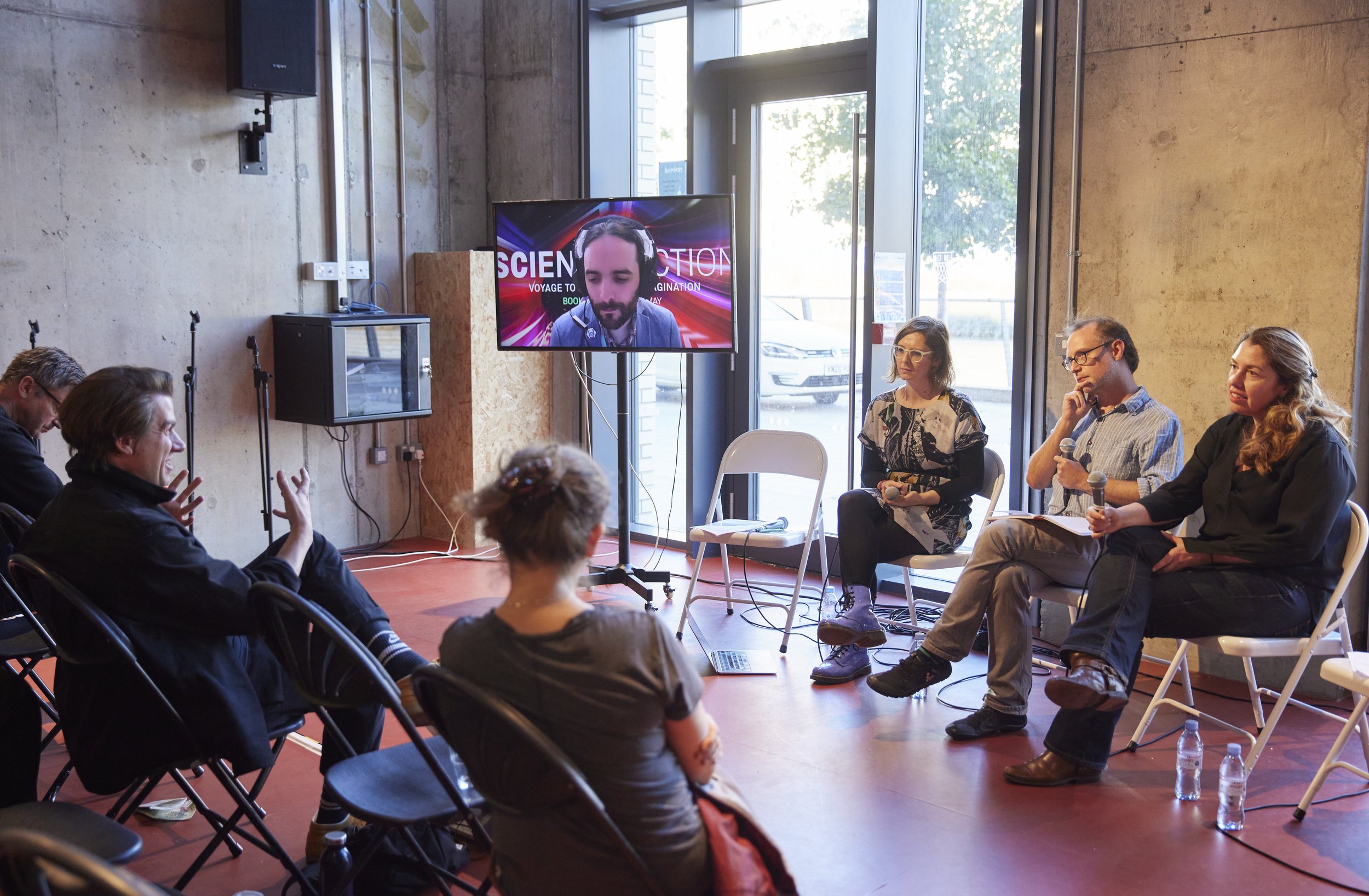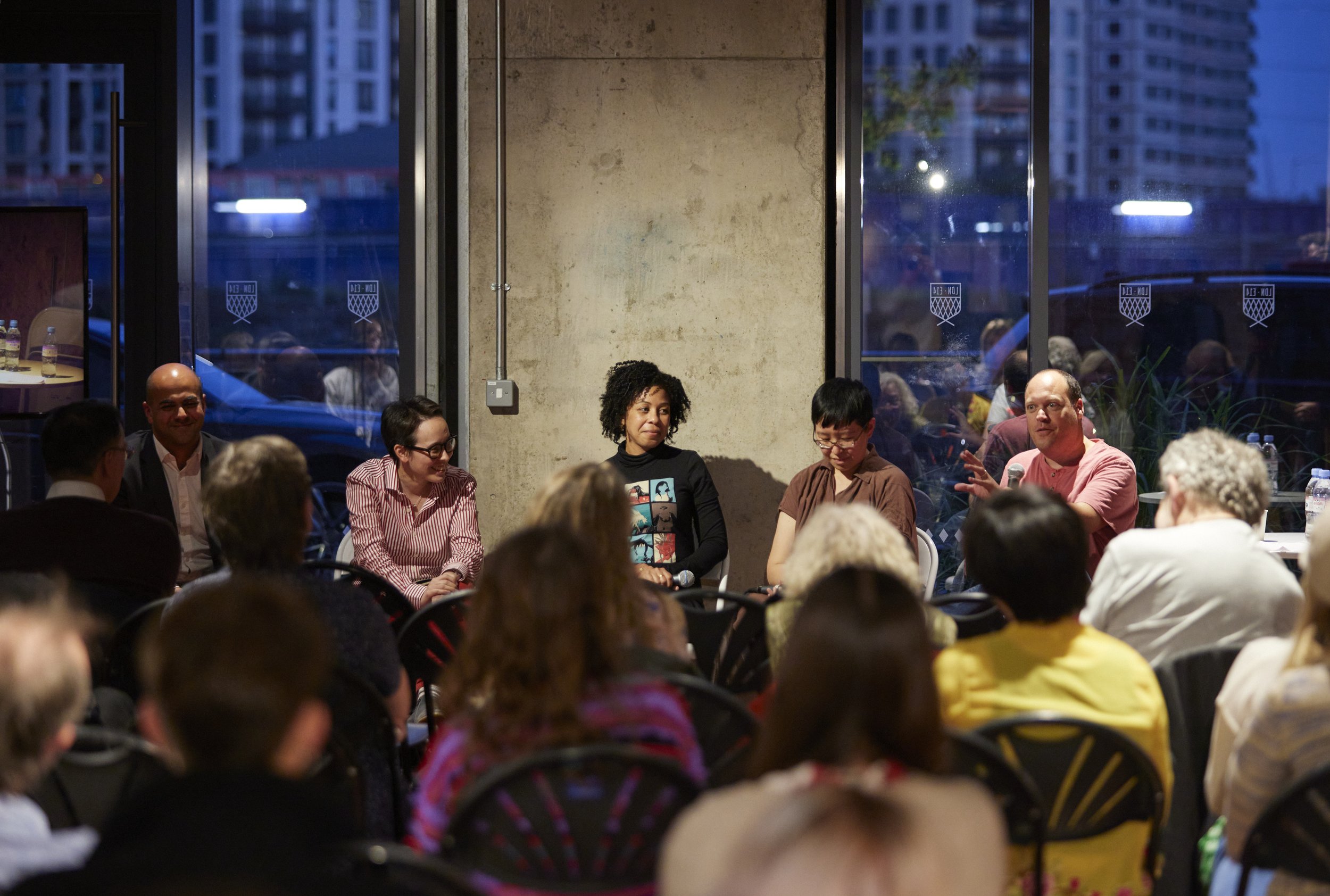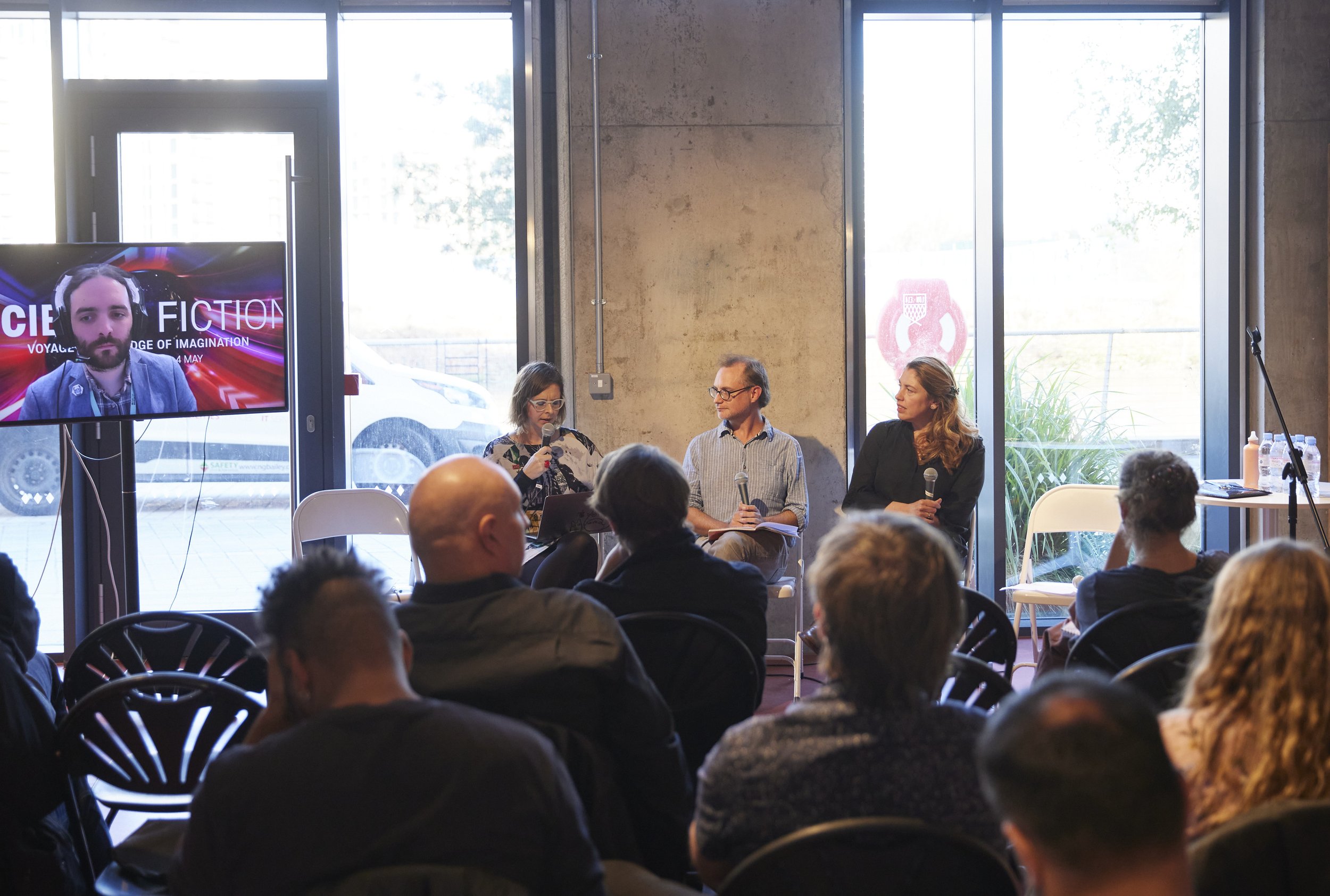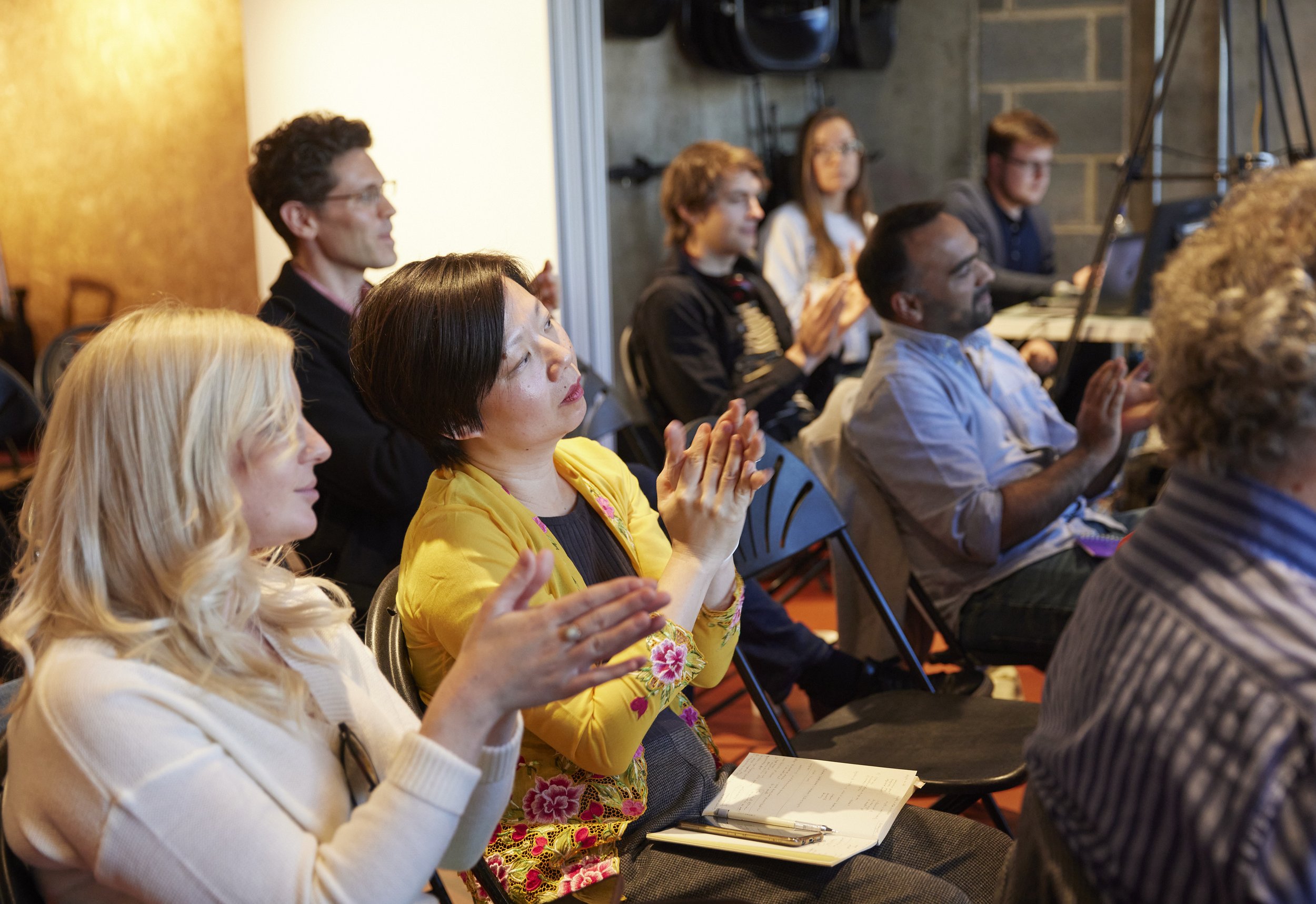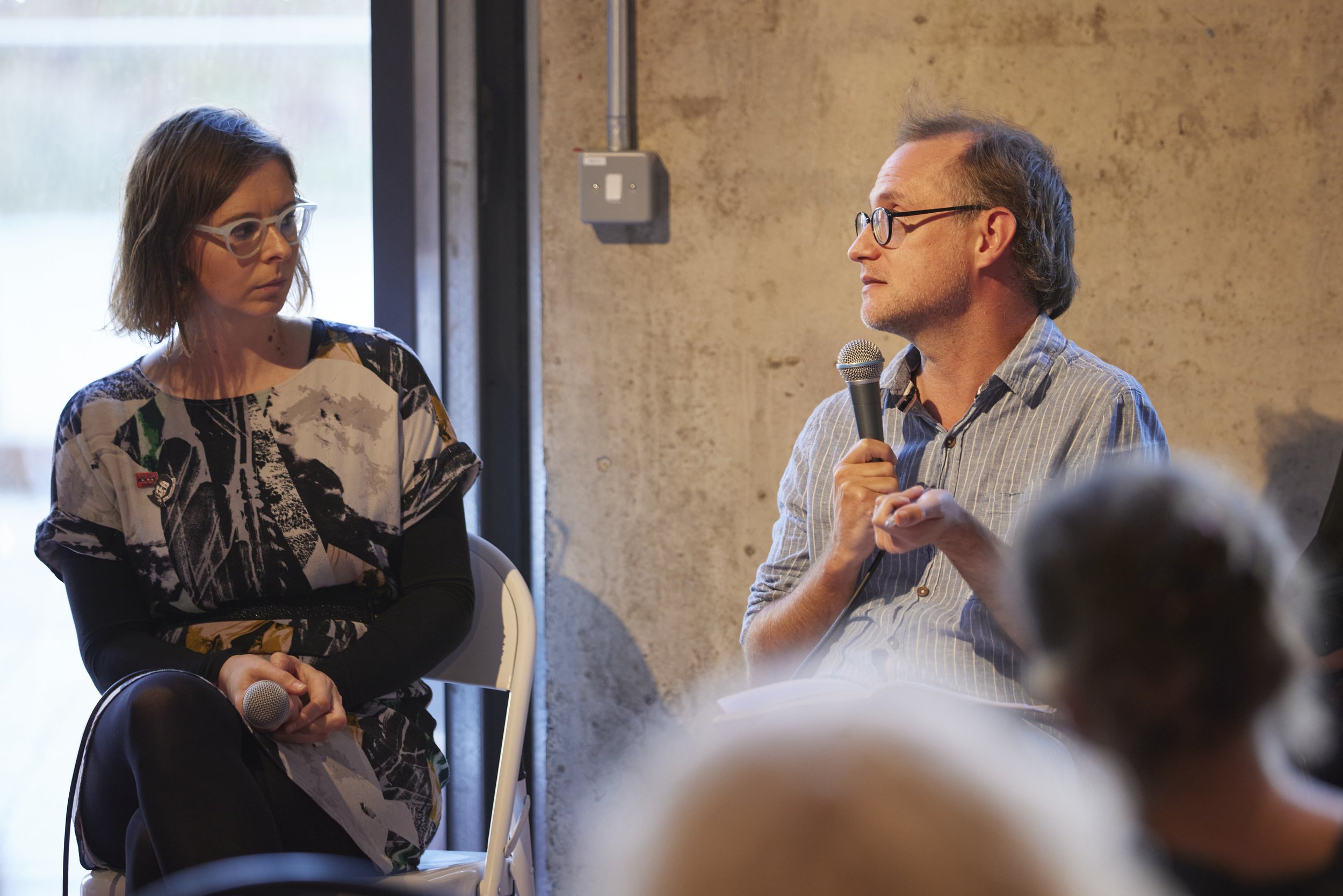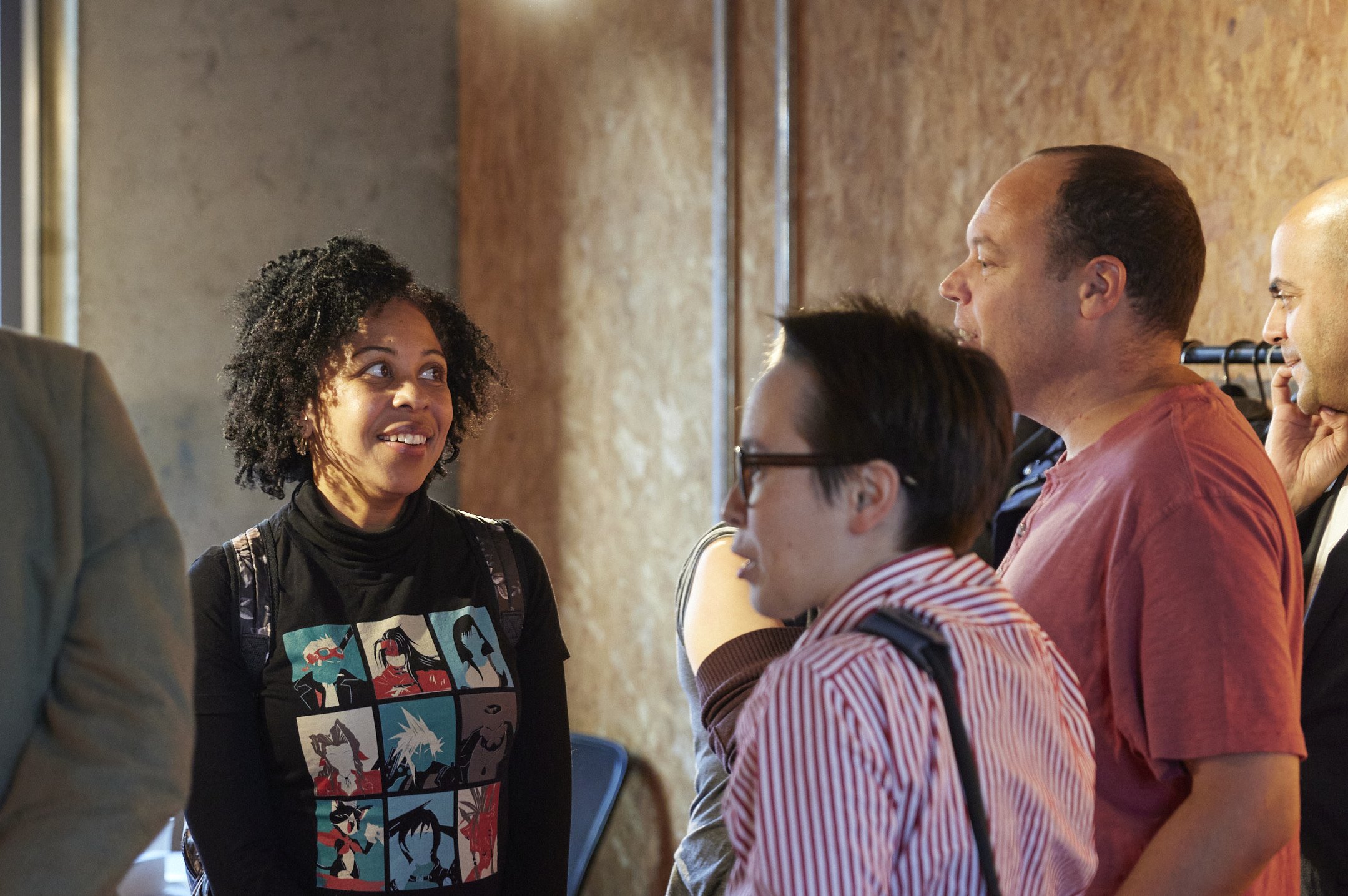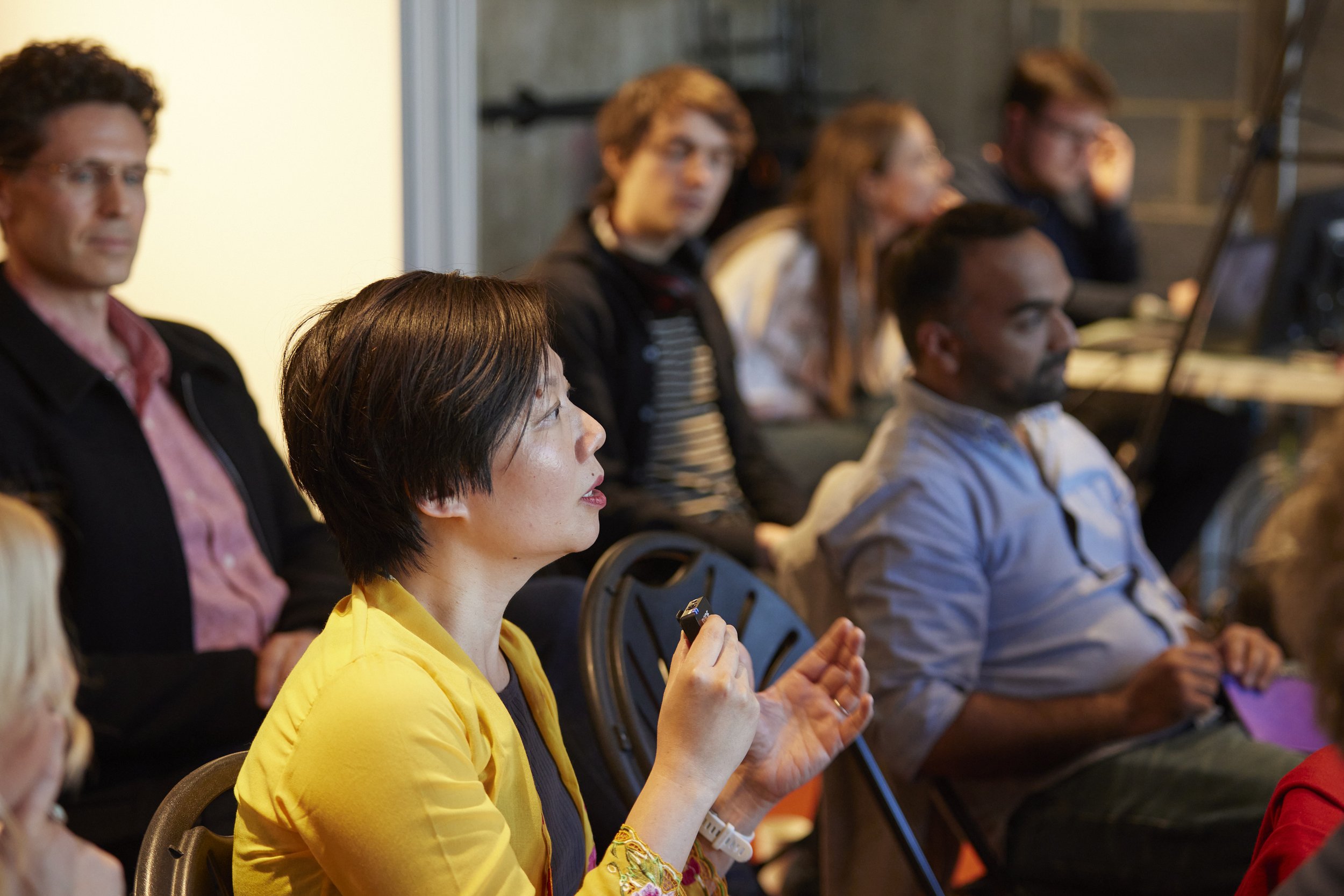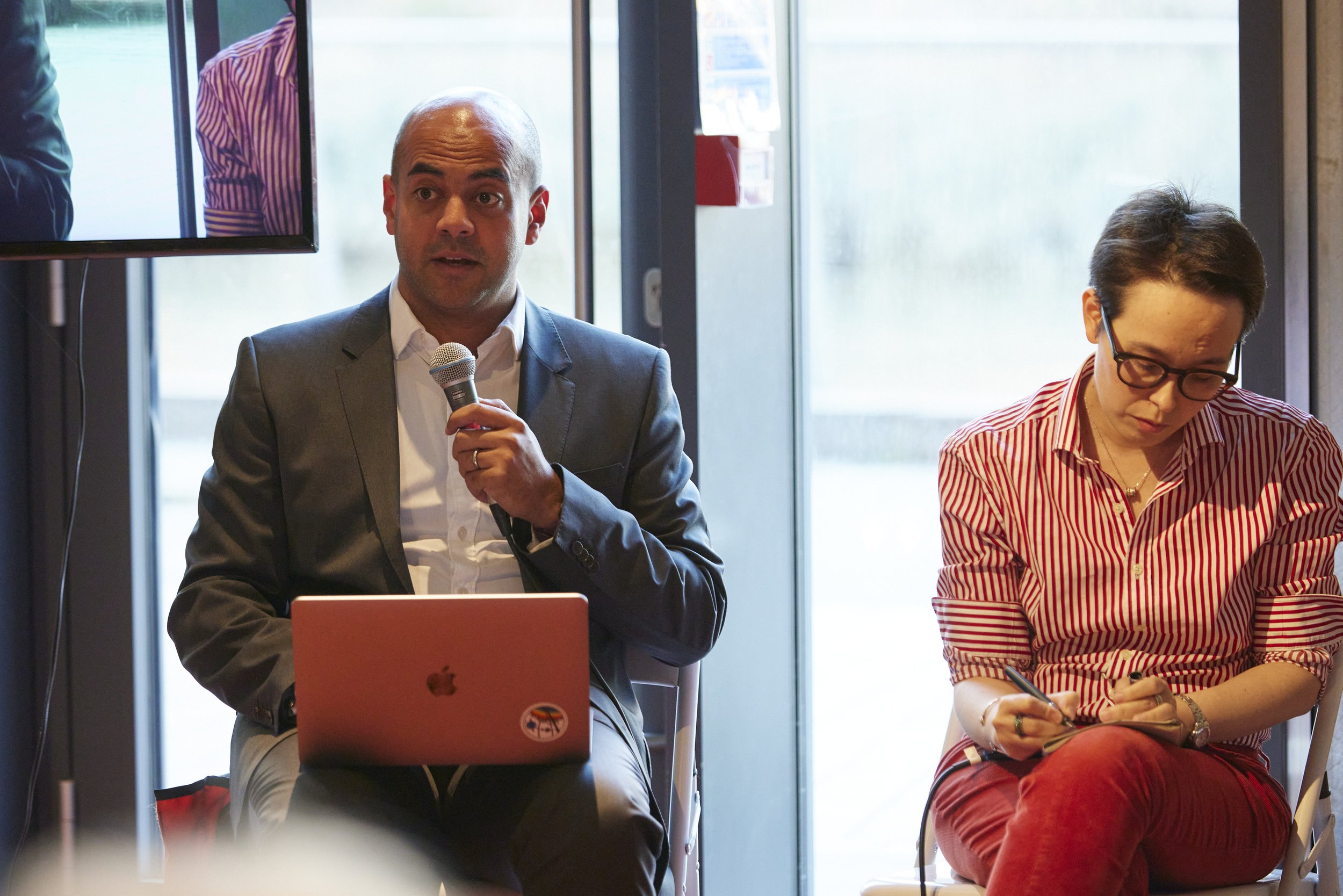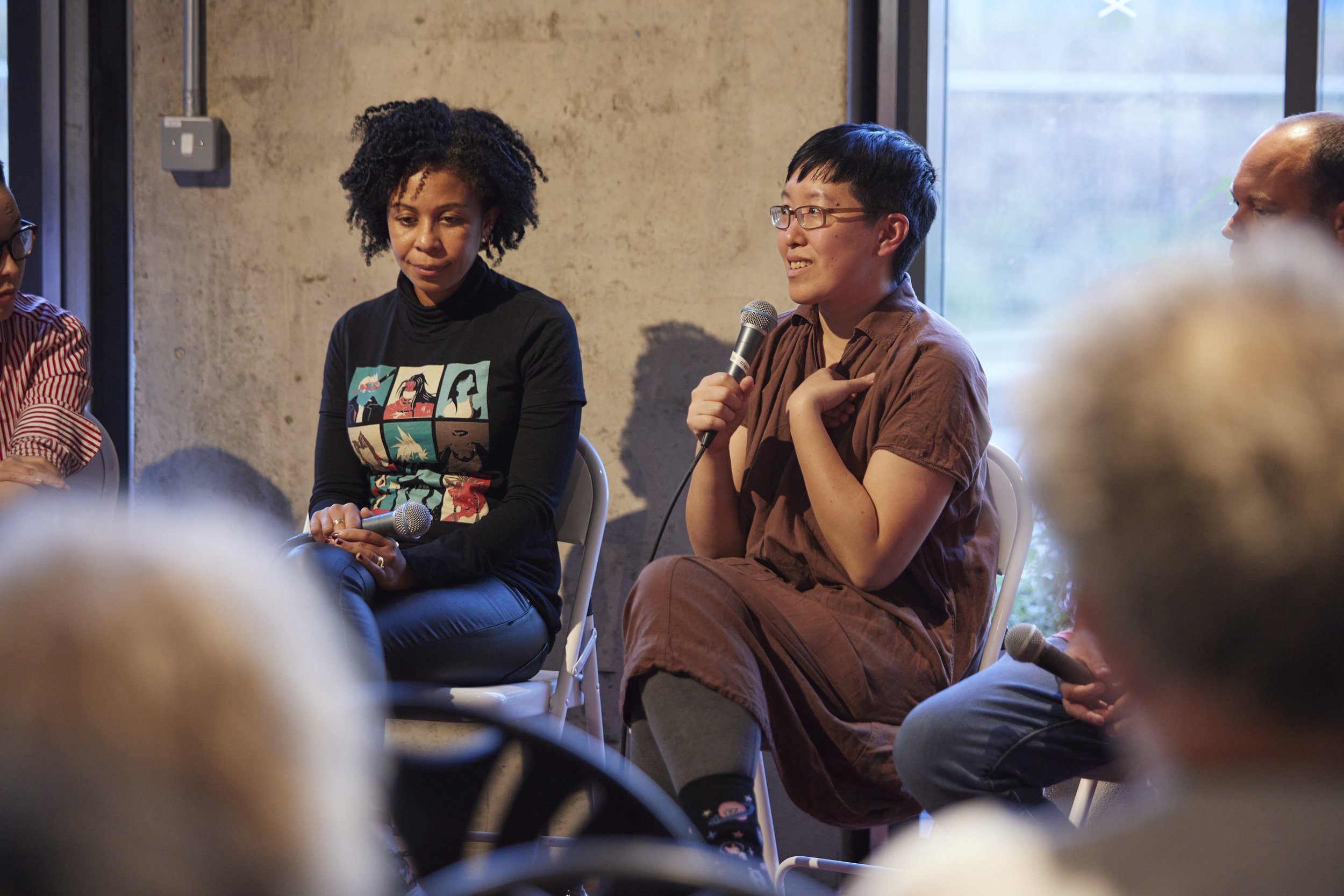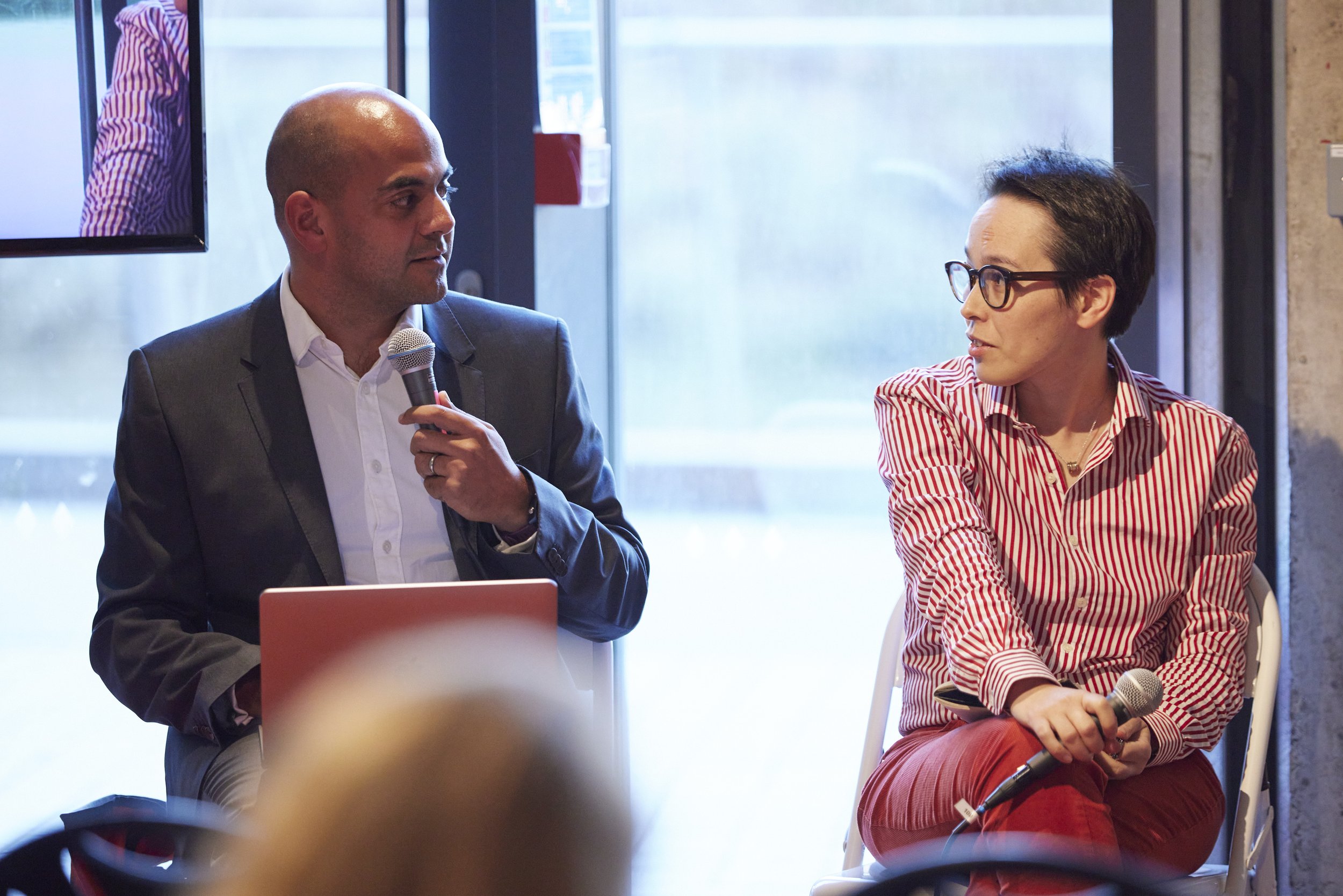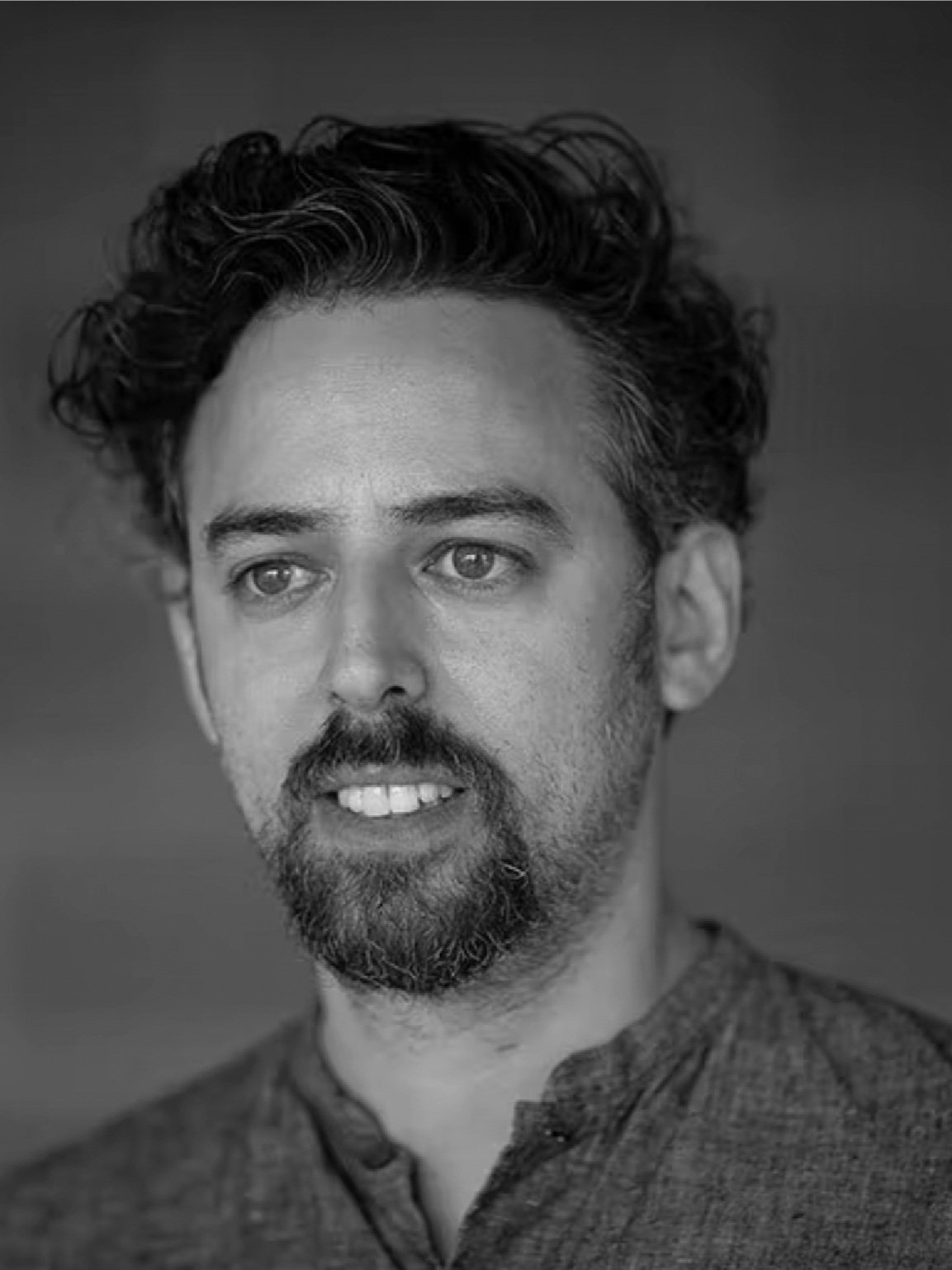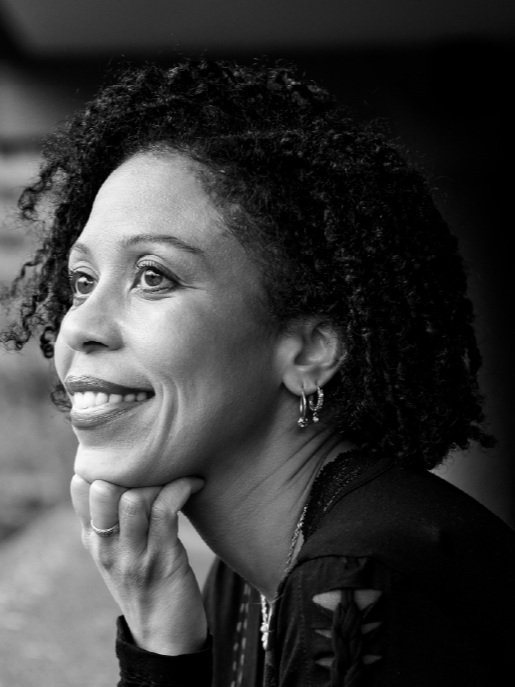Science Fiction Squared
Symposium exploring the future of science fiction
Part of arebyte 2022/23 programme Sci-Fi
Thu 29 Sep 2022, 13:30pm - 21:00pm
Island Social, Globe House, 34 Botanic Square, E14 0LU
Photograph by Oliver Rudkin
Science fiction is about the future - but what is the future of science fiction itself?
arebyte presents Science Fiction Squared, a one-day convention exploring the future of science fiction, as part of arebyte's 2022/23 programme Sci-Fi which looks at fictioning and alternative futures through a series of exhibitions, live performances, online experiences and educational activities.
Organised by former New Scientist and Arc editor-in-chief Sumit Paul-Choudhury Science Fiction Squared aims to broaden the conversation, looking outside the borders of artistic practice and delve into the realms science, research and philosophy. Since its invention, science fiction has taken many forms - from its beginnings in the gothic horror of Frankenstein, through the globe-trotting adventures of Jules Verne, the techno-utopianism of its Golden Age, the trippy fantasies of New Wave and the slick, corporate dystopias of cyberpunk. But what will it evolve into next?
At Science Fiction Squared, established and emerging science fiction creators and critics discuss how social and technological trends are likely to change the form and function of science fiction. What new challenges and eternal questions will tomorrow's SF address? Will it advocate for a better world, or warn against a worse one? Who will create it, and why?
Speakers include, among others, award-winning authors Lavie Tidhar and Aliette de Bodard and rising talents Neon Yang and Modupe Ayinde, as well as renowned commentators Adam Roberts, Caroline Edwards and Stewart Hotston. The event culminates with the ground-breaking performance ℧R by acclaimed collective Fronte Vacuo.
Symposium Programme
13:30 - 13:55 - Opening Notes
14:00 - 15:30 - The Mythology of the Future
15:45 - 17:15 - Utopian Dreams, Dystopian Visions
17:30 - 19:00 - A Mirror of Society
30’ break with refreshments at arebyte Gallery
19:30 - 20:00 - ℧R - performance by collective Fronte Vacuo
20:15 - 21:00 - Artist talk with Fronte Vacuo
PANEL DISCUSSIONS AND SPEAKERS
13:30 - 13:55: Opening Notes
by Sumit Paul-Choudhury and Nimrod Vardi
Sumit Paul-Choudhury
Writer
-
Sumit Paul-Choudhury say’s “I write, think and dream about science, technology and the future. My studio, Alternity, investigates under-explored possibilities through alternative histories, social experiments and applied speculation. I’m a Trustee of the UK Antarctic Heritage Trust, of the arebyte Gallery and of Cove Park artists’ residency centre. I am also a Sloan Fellow of London Business School, a Visiting Research Fellow in the Computing department at Goldsmiths and a Fellow of the RSA. Trained as a physicist at Imperial College, where I earned a first-class B.Sc., I subsequently turned my hand to journalism. I started out in arts criticism but spent most of the next fifteen years writing about business and technology in London and New York, with an emphasis on financial engineering and risk management. In 2008, I joined New Scientist, the world’s most popular science weekly, where I served as editor-in-chief until 2017. In addition to the day job, I was editor-in-chief of Arc, an acclaimed digital publication dedicated to the future, between 2012 and 2014; and in 2016 I served as founding creative director for New Scientist Live, the world’s most exciting festival of ideas and discovery.”
Nimrod Vardi (arebyte) Founder and Creative director
-
Nimrod Vardi, Founder and Creative Director of arebyte, East London. arebyte was set up in2013 as a non-for-profit space dedicated to the exploration of the intersection between art and everything that is digital. In 2017, arebyte moved to a new and larger site, which allowed Vardi and the team tofurther develop arebyte’s exciting programme giving room to more ambitious commissions,new strands of operations and growing arebyte’s reputation nationally and internationallyas one of the leading digital art spaces in the UK.In 2021 Vardi was named one of Art & Tech 40 Under 40 people by Apollo Magazine.He is also the founder and director of Arbeit Studios (Est. 2010) and Spacecraft.works (Est2018).
14:00 - 15:30: Panel discussion 1
The Mythology of the Future
with Adam Roberts, Beth Singler, Yen Ooi
Mythology seeks to explain the unknown past; science fiction to explore the unknowable future. How do the forms of mythology relate to those of science fiction, and how are they received by their audiences?
Adam Roberts (CHAIR)
Author & Professor
-
Adam Roberts is the author of 24 science fiction novels, and many non-fiction and academic works, including a History of Science Fiction (2nd ed Palgrave 2016). His most recent novel is The This (Gollancz, 2022). He is professor of nineteenth-century literature at Royal Holloway, University of London, and lives a little way west of London.
Beth Singler (REMOTE)
Anthropologist & Professor
-
Dr Beth Singler is the incoming Assistant Professor in Digital Religion(s) at the University of Zurich, joining from the University of Cambridge where she has been the Junior Research Fellow in Artificial Intelligence for the past four years. Her anthropological work explores the social, ethical, and religious implications of artificial intelligence, paying attention to the impact of science fiction narratives, metaphors, memes, and tropes on how we think about machines that might think. She has been invited to speak about the impact of AI at the Hay Festival, on many BBC radio and TV programmes, at the London Science Museum, and at Science Festivals, including Cheltenham, Cambridge, and Edinburgh.
Yen Ooi
Writer & Researcher
-
Yen Ooi is a writer-editor-researcher whose works explore East and Southeast Asian culture, identity and values. Her projects aim to cultivate cultural engagement in our modern, technology-driven lives. She is a PhD candidate at Royal Holloway, University of London looking at the development of Chinese science fiction by diaspora writers and writers from Chinese-speaking nations. Yen is narrative director and writer on Road to Guangdong, a narrative-style driving game. She is author of Rén: The Ancient Chinese Art of Finding Peace and Fulfilment (non-fiction), Sun: Queens of Earth (novel) and A Suspicious Collection of Short Stories and Poetry (collection). She is also co-editor of Ab Terra, Brain Mill Press's science fiction imprint. When she's not got her head in a book, she lectures, mentors and plays the viola. www.yenooi.com
Jennifer Woodward
Lecturer & Researcher
-
Jennifer Woodward is a senior lecturer and Programme Leader for the BA Film degree in the
Department of English and Creative Arts at Edge Hill University. Her PhD examined British Disaster Science Fiction literature and her wider research interests include speculative fiction across media and adaptation studies. Her publications include work on disaster science fiction as well as adaptation. She is also on the Editorial Board for Gylphi Press’s SF Story Worlds series.
15:45 - 17:15: Panel discussion 2
Utopian Dreams, Dystopian Visions
with Caroline Edwards, Jo Walton, Sumit Paul-Choudhury, Glyn Morgan
Science fiction has been purposefully authored to argue for utopias to be strived for and to caution against dystopias to be avoided. Do SF creators have a moral duty to welcome or warn of particular futures? And whose worldviews win out?
Caroline Edwards (CHAIR)
Lecturer & Researcher
-
Dr Caroline Edwards is Senior Lecturer in Modern & Contemporary Literature at Birkbeck, University of London where she is Director of the Centre for Contemporary Literature. Her research focuses on utopian possibility as it intersects with questions of aesthetic form, genre, temporality, political subjectivity, and post/inhuman agency – in literary as well as popular, cultural, and performative texts. She is author of Utopia and the Contemporary British Novel (Cambridge University Press, 2019), co-editor of China Miéville: Critical Essays (Gylphi, 2015) and Maggie Gee: Critical Essays (Gylphi, 2015) and editor of The Cambridge Companion to British Utopian Literature and Culture, 1945-2020 (forthcoming). Caroline is currently writing her second monograph, Hopeful Inhumanism: The Elemental Aesthetics of Ecocatastrophe, which examines strangely hopeful moments of inhuman collaboration within the elemental contexts of the lithic, the mycological, the arboreal, and the hydrological. Her research has featured in a number of publications, broadcasts, and venues, including the New Statesman, the Times Higher Education, the Guardian, SFX Magazine, BBC Radio 4, BBC Radio 3, BBC One South East, the Barbican Centre, the Institute of Contemporary Arts, Whitechapel Gallery, and the Museum of London.
Jo Walton
Writer & Researcher
-
Jo Lindsay Walton is a science fiction writer, a researcher at the Sussex Humanities Lab, and a co-editor of Vector, the critical journal of the British Science Fiction Association.ich won the World Fantasy Award in 2004.
Sally Adee
journalist
-
Sally is a science and technology journalist in London. Her award-winning stories about microchip kill switches, the Westphalian future of the internet, young blood, and toxic mould have appeared in BBC Future, The New York Times, IEEE Spectrum, The Economist, and New Scientist, where she was a technology features and news editor for seven years and where she now writes a monthly science fiction column. She is currently finishing her first book, We Are Electric, which tells the story of the electrome - the multiple layers of bioelectric communication networks that govern our bodies, our health, our brains, and the rest of the natural world.
Glyn Morgan (REMOTE)
Curator & Author
-
Dr Glyn Morgan is a curator at the Science Museum working on temporary exhibitions. His latest project is a genre-blending blockbuster “Science Fiction: Voyage to the Edge of Imagination” due to open on 6th October, it is accompanied by a standalone book of essays, interviews and artworks of the same title published by Thames & Hudson. He is also a science fiction scholar, with particular specialism in issues of time and history, and author of Imagining the Unimaginable: Speculative Fiction and the Holocaust (Bloomsbury, 2020) and co-editor of Sideways in Time: Critical Essays on Alternate History Fiction (Liverpool University Press, 2019).
17:30 - 19:00: Panel discussion 3
A Mirror of Society
with Steward Hotston, Lavie Tidhar, Neon Yang, Modupe Ayinde, Aliette de Bodard
Twentieth century-science fiction is identified with a particularly Western worldview, but now a far broader range of global perspectives are being brought to bear. How will these revitalise the genre?
Stewart Hotston (CHAIR)
Writer
-
Stewart Hotston lives in Reading, UK. He has had numerous short stories published as well as six novels, the latest of which is The Entropy of Loss from NewCon Press. Stewart has been a judge for numerous literary prizes, written about diversity within genre as well as writing criticism for Sci Fi Bulletin. He is guest editing the Justice in SFF issue of Vector magazine. When Stewart is not writing or working, he's either LARPing or fighting with swords.
Lavie Tidhar
Author
-
Lavie Tidhar is the World Fantasy Award-winning author of Osama, Campbell and Neukom winner Central Station, Jerwood Fiction Uncovered Prize winner A Man Lies Dreaming and many others. He created and edited the groundbreaking Apex Book of World SF series (2009-2018), editing the first three volumes and remaining as series editor for the next two. In 2021 he launched The Best of World SF series from Head of Zeus. He has also written extensively on international SF/F in a regular column for The Washington Post. His latest novel is historical epic Maror (2022), described as a “literary triumph” by the Guardian.
Neon Yang
Author
-
Neon Yang is the author of the Tensorate series of novellas from Tor.Com Publishing (The Red Threads of Fortune, The Black Tides of Heaven, The Descent of Monsters and The Ascent to Godhood). Their work has been shortlisted for several awards, including the Hugo, Nebula, and World Fantasy Awards. Their debut novel, The Genesis of Misery, will be published by Tor in September 2022. They are queer, nonbinary, and live in Norwich.
Modupe Ayinde
Writer
-
M. H. Ayinde (she/her) is a fantasy and science fiction writer born in London’s East End. Her short fiction has appeared or is forthcoming in FIYAH Literary Magazine, F&SF, Fantasy Magazine, Daily Science Fiction, Omenana Magazine and elsewhere, and she is a copy editor for speculative fiction magazine Strange Horizons. She was the 2021 winner of the Future Worlds Prize for SFF writers of colour for her novel, A Shadow in Chains. She’s worked as a video games reviewer, book publicist and magazine sub editor, and currently tinkers with spreadsheets for a large news organisation. She lives in London with three generations of her family and their Studio Ghibli obsession.
Aliette De Bodard
Author
-
Aliette de Bodard writes speculative fiction: she has won three Nebula Awards, an Ignyte Award, a Locus Award and five British Science Fiction Association Awards. She is the author of Of Charms, Ghosts and Grievances (JABberwocky Literary Agency, Inc), a fantasy of manners and murders set in an alternate 19th Century Vietnamese court, and of the forthcoming lesbian space pirates romance The Red Scholar’s Wake (Gollancz, Nov 2022). She lives in Paris.

